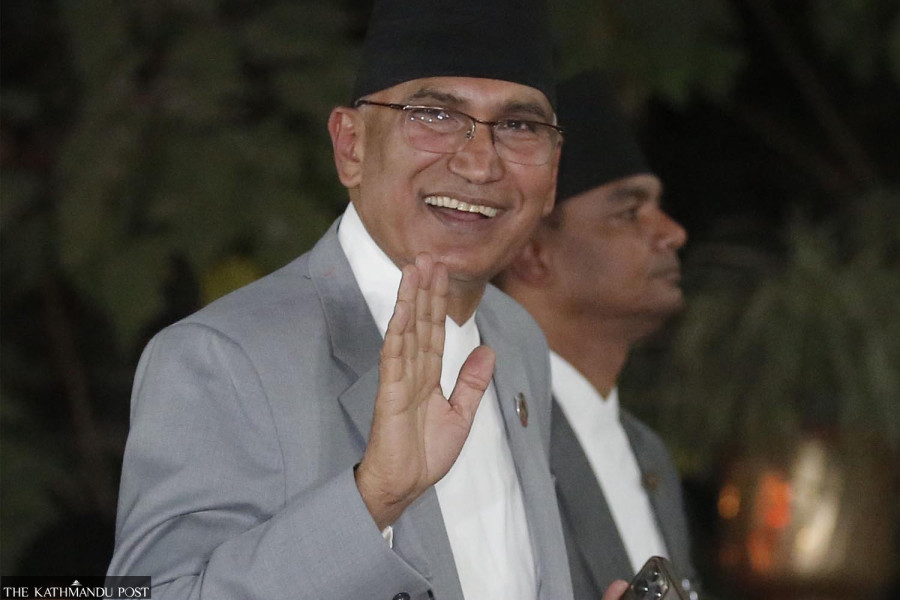Money
Finance minister inherits a troubled economy again
Deputy Prime Minister and Finance Minister Bishnu Poudel vows to take measures to overcome the economic problems.
Prithvi Man Shrestha
Amid rumours that Bishnu Poudel is becoming the new finance minister, the share market began to make upward moves from Monday morning.
As the market closed, the Nepal Stock Exchange (Nepse) index rose by 56.88 points, appearing to welcome Poudel’s appointment as Deputy Prime Minister and Finance Minister in the new Pushpa Kamal Dahal-led government.
“It is the share market’s embrace of Poudel because it took an upward turn during his tenure even in the past,” said Rajan Lamsal, vice-president of the Nepal Investors’ Forum, a grouping of share market investors. “I don’t remember what significant work he did to help the share market grow in the past. But, he listened to our concerns. At least, he didn’t utter bad words about the share market, unlike some other finance ministers.”
According to Lamsal, Poudel helped the share market to grow by coordinating with the central bank on the issue of supporting the stock market.
There is a history that whenever Poudel became finance minister, the share market scaled new peaks. It is Poudel’s third stint as finance minister.
When Bishnu Poudel became finance minister back in October 2015, the share market index was hovering over 1,100 points which crossed 1,800 points under his nose when he left office in August 2016.
However, the market slumped under the earlier governments led by Pushpa Kamal Dahal and Sher Bahadur Deuba.
During his second stint as finance minister in 2020, the Nepse index reached another peak of more than 3,000 points. When Poudel was appointed finance minister on October 14, 2020 for a second time, the Nepse was at 1561.16 points.
By the time he left office on July 13, 2021, the stock market had climbed down to 2,871.04 points after surpassing 3,000 points just a month earlier. Though the index climbed further, briefly, under the Deuba-led government for about a month, reaching a high of 3199.02 points on August 17 last year, it began to nosedive thereafter.
Investors have complained that the market nosedived due to the unfriendly policies of the central bank along with liquidity crunch in the banking sector. “We expect him to coordinate with the Nepal Rastra Bank to help the share market,” said Lamsal.
However, Poudel's earlier stints as finance minister have also been coinciding with economic troubles. When he became finance minister for the first time in October 2015, he was facing an economy badly affected by earthquakes and India’s trade blockade.
In his second stint, he was facing an even bigger economic crisis caused by the Covid pandemic. As he becomes the finance minister for a third time, the country is once again facing many economic challenges including high inflation, liquidity crunch, reduced industrial production, depleted foreign exchange reserves and reduced growth in revenue collections.
Even though under his watch, the share market performed well, the country’s economic growth nosedived, particularly due to the impact of the trade blockade and later, the pandemic.
For example, the country’s economy grew by just 0.43 percent in fiscal year 2015-16 when he had, by and large, implemented the budget announced by Ram Sharan Mahat, a Nepali Congress leader and a six-time finance minister.
Even though Poudel presented the budget for the fiscal year 2016-17, he was no longer there to implement his own budget, as the Oli Cabinet was replaced by a Maoist-Congress coalition government in August 2016 when Pushpa Kamal Dahal became the prime minister.
In 2020-21, he implemented the budget presented by his predecessor Yuba Raj Khatiwada, from his own party and the economic growth was 4.25 percent, a slight recovery from negative growth of 2.37 percent in the preceding fiscal.
Though he presented the budget for fiscal year 2021-22, the government led by Oli was replaced by Nepali Congress chair Sher Bahadur Deuba as per an order of the Supreme Court in July 2021.
This time Poudel has to implement the budget presented by his predecessor Janardan Sharma, who is also a leader of the new coalition partner—the CPN (Maoist Centre).
As the country’s economy performed badly during his past tenure, questions are being asked whether the situation would be anything different this time.
It is obvious that he is not the expert on economy like his predecessor Sharma and questions are being asked as to how seriously he has understood the current economic challenges.
While assuming office at the Finance Ministry on Monday, Poudel admitted that the economy was on the verge of a crisis. “I will make an effort to solve the economic challenges by identifying the causes,” he said, adding that the state agencies have observed the problems of the economy and he would focus on solving them.
The observers, however, say that it would be very challenging for him to overcome the current economic problems which are multidisciplinary. “He is not an economist but an experienced politician and personally, he laboured hard as finance minister,” said former finance secretary Rajan Khanal. “But there are immense economic problems facing the country, which appear difficult to resolve.”
In the early months of the last fiscal year, the country imported heavily, which resulted in a balance of payments deficit and a sharp decline in the foreign exchange reserves, raising questions if Nepal was heading the Sri Lankan way.
The government took import control measures and starting from April, it banned the imports of various goods, including vehicles, liquors, expensive mobile sets and television sets.
Due to the massive lending which, according to the NRB, mostly went towards financing the imports, the country reeled from a liquidity crunch which still persists, leading to a rise in interest rates.
Particularly due to the Russia-Ukraine war and supply chain constraints, inflation increased sharply across the world and as an import-dependent country, Nepal is grappling with the after-effects of more than an eight percent inflation rate.
While there has been an improvement in the status of balance of payments and foreign exchange reserves, the business community is complaining that there is little demand for goods and services, which has forced many of them to partially shut down factories and businesses.
“Now, weak demand has emerged as a big challenge for the economy,” said Khanal. “It is because most people’s income has not grown since the pandemic. There is also no credit-driven demand boom because of the liquidity crunch in the banking sector.”
According to Khanal, even after the government lifted a ban on imports of certain goods from mid-December, the importers don’t want to import goods due to a lack of confidence whether these goods would get sold in the market.
During the first five months of the current fiscal, imports slumped by 20 percent, according to the Department of Customs. As a result, the government's revenue has been badly affected with current revenue collections not being enough to sustain even the current expenditure of the government.
“If the revenue collections don’t improve, the federal government won’t be able to provide the committed resources to the provincial and local governments through revenue sharing,” said Khanal.
On the other hand, citing the low demand, businesses have reduced production, leading to reduced power demands from the industrial sector, according to the Nepal Electricity Authority.
Private sector representatives said the industrialists have been postponing new investments due to the absence of demand. “Business confidence is down now because of lower demand, high interest rates and the liquidity crunch,” said Vishnu Kumar Agrawal, president of Confederation of Nepalese Industries.
At the moment, the Federation of Nepalese Chambers of Commerce and Industry, another industry body, is running a ‘Save the Economy’ campaign.
Former Finance Secretary Khanal said that the immediate need for the new government is to give the market the confidence that it is serious about solving the problems.
“The government, particularly the new finance minister, can issue a white paper on the state of the economy, while also announcing the key measures to be taken to solve the problems of the economy,” he said. “Even a small action could help restore business confidence.”
The private sector wants the government to solve the shortage of loanable funds in the banking sector which are driving the interest rates higher. “I heard that the government has extended the deadline of counting reserves funds of local governments in the banks as deposits till the fiscal year ends, which, if correct, is a good move,” said Agrawal, the CNI president.
“Necessary measures should be taken to reduce the interest rates which are also contributing to lower the confidence of the business community.”
And, the private sector is hopeful that the new finance minister will take measures to arrest the downturn in the economy. “Our general observation is that the new finance minister is friendly towards the private sector and we are hopeful that he will listen to us and try to solve the problems,” Agrawal added.




 10.12°C Kathmandu
10.12°C Kathmandu














